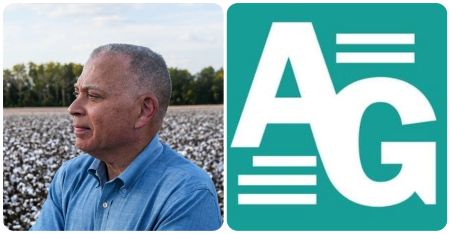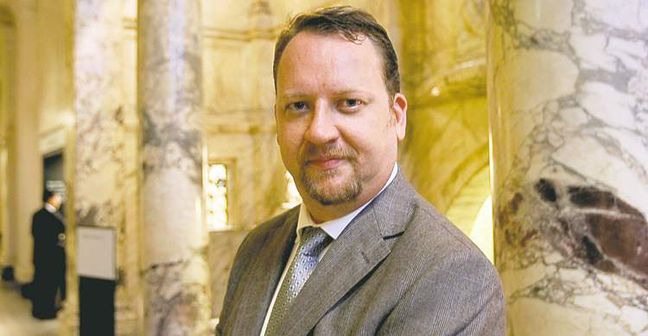The Authors Guild’s new president talks AI, challenging times, and seeing R.E.M. back in the day.

Along with authoring several books, including The House at the End of the Road: The Story of Three Generations of an Interracial Family in the American South and Ever Is a Long Time: A Journey into Mississippi’s Dark Past, W. Ralph Eubanks is a respected essayist, editor, and academic. Currently the Black Power at Ole Miss Faculty Fellow at the University of Mississippi’s Center for the Study of Southern Culture, Eubanks is also about to officially take over the reins at the Authors Guild, America’s oldest and largest organization for professional writers.
You’ve had a long career in the literary world, both on the writing side and on the editorial/publishing side. Are there particular professional experiences that have influenced your time as interim — and soon-to-be elected — president of the Authors Guild?
When I was director of publishing at the Library of Congress, I developed numerous books in collaboration with trade publishers. For each of those books, I negotiated the publishing contract on behalf of the Library of Congress, with the institution as the contractual “author.” During those years, I was also writing my own books and realized that there was a difference between the way my contracts as an individual were viewed at a publisher [and] those I was negotiating on behalf of a national cultural institution. That experience gave me a sense of what many authors were up against — although I knew more about contracts than the average author — so I have a personal connection to the rights of an author that the guild seeks to protect. The work of the guild seeks to empower authors in a way that they can learn as much about the business of writing that guards both their income and their intellectual property.
The Authors Guild is known for the services (e.g., legal representation, website development, etc.) it offers members, but it also facilitates writers’ building of community. Does the latter strike you as especially necessary in our current political climate?
I’m reminded of something Toni Morrison wrote about the duty of a writer in challenging times in our history. “This is precisely the time when artists go to work — not when everything is fine, but in times of dread. That’s our job!” As a writer whose work explores the American South and seeks to explore silences about the region’s past — as well as the ways that the South serves as a mirror to the rest of the country — I see my work as president of the guild as an extension of my work as a writer. Writers cannot be silenced or be punished for exploring silences. That is part of the work of the Authors Guild.
The use of AI in writing — an increasingly divisive issue — feels like an existential threat to some of us. What is the guild’s position on AI, and do you anticipate it evolving over time?
Artificial intelligence (AI) presents a challenge to the work of writers and to the copyright law that protects the work of writers. The tech industry wants to train AI by using the work of writers without their permission and without compensating them for that use. None of my contracts authorized the use of my work in AI, and like many writers, I do not want my work to be used in any way for AI unless I affirmatively authorize it and am compensated.
Our position at the guild is that literary expression comes from human beings, not machines. The guild seeks to protect the work of writers through our legal advocacy for the rights of writers in an AI-saturated world. We’ve also begun a “Human Authored” certification that provides authors a way to distinguish their work in [a] world where the line between literary creation and the work of a machine is becoming blurred. AI as a technology is not going away. But, like the guild, I believe we must not allow the unfettered use of technology to disrupt American literary culture.
New York City is the hub of, well, just about everything, so it makes sense that the Authors Guild (like many of its members) calls Manhattan home. But you call Washington, DC, home. Do you believe this gives you a different perspective than the guild’s past presidents?
I’ve lived in Washington a long time, worked in the legislative branch of government, and have a sense of how DC works (well, perhaps how it once worked). Today, I spend part of the year in my home state of Mississippi, where I am a professor at the University of Mississippi. The small town of Oxford, Mississippi, has over 40 working writers, from bestselling novelists to academic writers. Toggling between the small-town South and my home in Washington gives me some perspective on the literary landscape. And as a university professor, I know that in this particular moment, I am seen by some in this country and my home state as an enemy. I feel a personal obligation to advocate for the right of free expression for all writers, but particularly for academics, whose work is threatened at this moment.
Since the heart of your work is about the written word — and since readers love knowing what fellow travelers are up to — can you share any memorable books you’ve recently enjoyed?
Nathan Thrall’s A Day in the Life of Abed Salama: Anatomy of a Jerusalem Tragedy had a profound effect on me and is a book that I have recommended to many of my friends because of the raw emotional nature of the story the book tells. And I truly enjoyed Peter Ames Carlin’s The Name of This Band is R.E.M. since the music of that Athens, Georgia-based alt-rock band was the soundtrack of my youth (and I saw R.E.M. play in clubs around DC before they moved on to stadiums). I’m just beginning Adam Ross’ new novel, Playworld, which I plan to finish during my spring break. Adam, like me, moves between writing, editing, and teaching, and I admire the way he has revitalized the Sewanee Review.
Right now, reading midterm papers from my undergraduate students in my course on Southern Rights and Activism is my top priority. They are all writing on their understanding of the nature of social and racial power dynamics in the Jim Crow South. When the papers are all graded, I’ll need to escape into the 1980s New York that Adam captures so vividly in Playworld.
[Photo by Maude Schuyler Clay.]
Holly Smith is editor-in-chief of the Independent.
